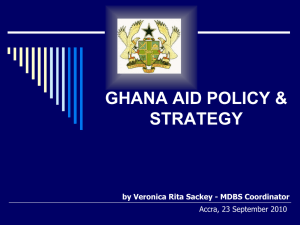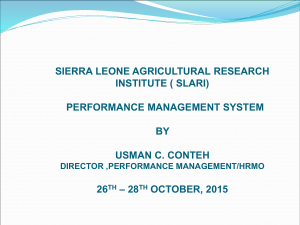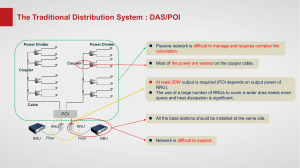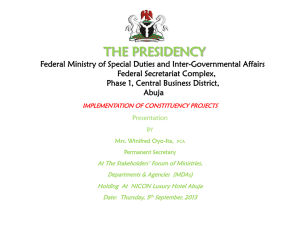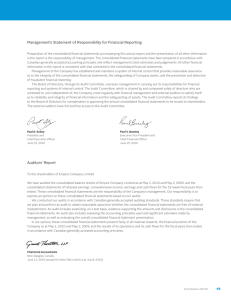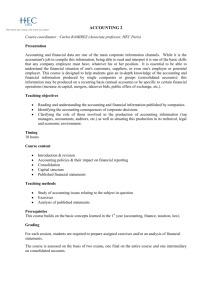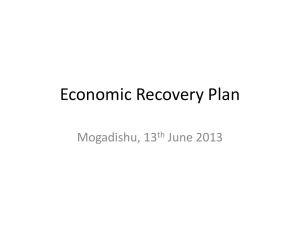Report on the Public Accounts of Ghana
advertisement
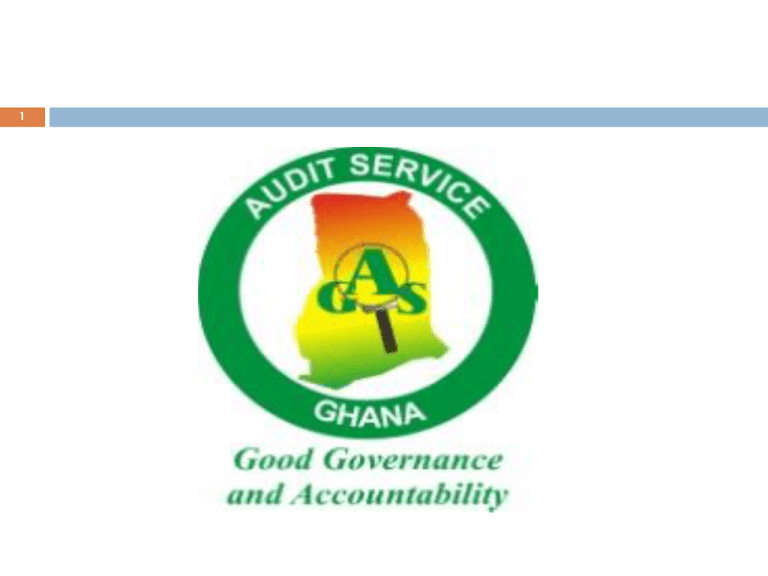
1 2 Presentation of the Auditor-General’s Report on the Public Accounts of Ghana (Consolidated Fund) to the Annual MDBS Joint Review Meeting OVERVIEW 3 Introduction Mandate Standards Main Findings of 2009 audit of the CF Way Forward Challenges Conclusion INTRODUCTION 4 Article 187(2) of the Constitution requires the AuditorGeneral to audit the whole of the public sector including the local government administrations, the courts, universities, public boards, corporations and all other public institutions operating or funded with public funds. The Central Government accounts is made up of: Public Accounts (Consolidated Fund) MDAs Accounts INTRODUCTION 5 This presentation relates to the Consolidated Fund or the Public Accounts for 2009. The purpose of the presentation is to highlight the main findings of the audit of the Public Accounts for 2009 within the context of the Public Financial Management (PFM) framework. MANDATE 6 The mandate of the Auditor-General requires that within six months after the end of the financial year he should report on the public accounts of Ghana to Parliament; and in that report draw attention to any irregularities in the accounts audited, and to any other matter which in his opinion ought to be brought to the notice of Parliament. The Auditor-General therefore provides assurance to the citizens, and other investors in Government that public monies collected or received from them are fully accounted for and used judiciously towards the attainment of stated goals and objectives. MANDATE 7 The submission of the Auditor-General’s Report on the Public Accounts of Ghana to Parliament on the due date prescribed by the Constitution constitutes a trigger for the release of funds by the donors to Government. Sections 13 & 15 of the Audit Service Act, 2000 (Act 584) require, among other things, that the Auditor-General should ensure that the public accounts have been properly kept and to give an audit opinion on the financial statements of the Consolidated Fund. STANDARDS 8 The Act requires that INTOSAI Standards and methodologies should be used in the conduct of the audit. These standards require among other things that the audit is planned and performed so as to obtain all the information and explanations which are considered necessary in order to provide the auditor with sufficient evidence to give reasonable assurance that the financial statements are free from material misstatements, whether caused by fraud or other irregularity or error. STANDARDS 9 To enable this to be achieved the standards require that the SAI should have the necessary resources which should be determined independently of the audited entity. MAIN FINDINGS 10 1.Revenue & Other Receipts for 2009 Total receipts in the Public Accounts amounted to GH¢9.64 billion, an excess of GH¢78.9 million over previous year’s actual. Included in this, is a budget support of GH¢688.6 million from the Multi Donor Budget Support Partners made up of GH¢339.7 million loans and GH¢348.9 million grants. The total receipt of GH¢9.64 billion exceeded the budgeted amount of GH¢9.35 billion, a marginal increase of GH¢288.9 million. 2.Total Expenditure for 2009 12 Total expenditure for 2009 amounted to GH₵9.36 billion and expenditure exceeded by the GH₵3.97 previous billion. The years total expenditure of GH₵9.36 billion exceeded the budgeted amount of GH¢9.28 billion also by a marginal amount of GH¢82.02 million. During 2009, total receipts therefore exceeded total expenditure by GH₵285 million. 3. Un-reconciled Bank Balances 13 As previously reported, we noted that major GoG Accounts Cashbook balances including Social Impact Mitigation Levy, Petroleum Levy, NHIL, MoFEP Divestiture, Special Collections and Civil Servants 17.5% SSF Accounts, with a total figure of GH¢85.7 million was not reconciled with their related bank statements during the year under review. Considering the significant nature of the accounts involved, we reiterated our previous recommendation that a proper investigation be carried out to ascertain the actual balances of the respective accounts. 4. Inconsistencies in the records between CAGD and MDAs 14 The financial statement of the Consolidated Fund were characterised by over statements and under statements resulting from poor record keeping and lack of information flow among key agencies. 17 MDAs that were sampled for audit revealed significant differences between the amount disclosed as expenditure in the Public Accounts and the related supporting documents at the MDAs. To minimise the risk of errors and omissions, we recommended strong collaboration between CAGD and the MDAs to provide assurance on the accuracy of accounting information relating to the Public Accounts. 5. Non-preparation of Financial Statements by MDAs 15 The FAA requires MDAs to prepare monthly and annual financial statements and to submit them to the Controller and Accountant General, Minister of Finance and the Auditor-General. However, lack of capacity on the part of the MDAs have prevented them from complying with the law. 6. MDAs Non-certification of Salary Payment Vouchers 16 Out of 17 MDAs visited, the Heads of only two (2) namely, the Public Services Commission and Ministry of Education, examined and certified the accuracy of their monthly salary vouchers administered on their behalf by CAGD. To strengthen controls and improve on the integrity of payroll data, we recommended that CAG should ensure that Heads of MDAs strictly adhere to Regulation 304 of the FAR, 2004. 7. Inadequate accounting of Foreign Missions’ Special Collections 17 Transfers made by the Ghana Mission in London (GML) into the Dollar Account, Euro Account and the Pound Sterling Account totalling US$4.3 million, €3.6 million and £958,608.75 respectively were not supported with monthly returns. We recommended that the CAG should enhance his supervisory review procedures over the activities of the Head of Treasury at the GML, and should ensure that all Special Collections transfers are supported with adequate returns. 8. Inadequate record keeping of GoG Equity Investments 18 Contrary to regulation 146(2) of the FAR, 2004 which requires disclosure of GoG investment in the Public Accounts, we noted some material inaccuracies in the disclosure of some GoG investments in the Public Accounts. We recommended that CAG should improve upon his record keeping on investment and strengthen his collaboration with MoFEP to ensure that all financial records and adjustments relating to GoG investments are updated. 9. Delays in the transfer of Indirect Tax and Non-Tax Revenue 19 We noted long delays in the transfer of indirect Tax and Non-Tax Revenue (NTR) lodgements from various transit accounts into the Consolidated Fund. We also noted that, no reconciliations were performed by MDAs to agree their NTR records with the relevant bank statements. We recommended strong oversight by MoFEP in ensuring that the banks submit regular statements to the relevant MDAs. MoFEP should also ensure that all MDAs reconcile returns with the relevant bank statements before submission to MoFEP and CAGD. 10.Delays in the transfer of Indirect Tax and Non-Tax Revenue cont’d 20 We also recommended that MoFEP should compel the banks to provide the necessary facilities as stated in the agreement to ensure the effective monitoring of NTR collections. Additionally, we recommended that MoFEP should enforce the penalty clause where it is established that there have been delays in lodgements into the Consolidated Fund. 21 11.Poor Management of Public Loans Management of Public loans continued to pose problems to CAGD and MoFEP resulting in a doubtful debt amounting to GH¢669.3 million. CAG should seek the assistance of MoFEP to reconcile the public loan balances with the beneficiary institutions. 12.Non-payment of GoG Guaranteed Loans 22 Out of a total ECGD loan of £112.5 million guaranteed by government between 1990 and 1996 for 21 private companies, only one company had fully paid up leaving a balance of £86.9 million outstanding as at the end of December 2009 MoFEP should institute appropriate legal measures to recover the outstanding loan from the companies in default. THE WAY FORWARD 23 There should be coordination between Bank of Ghana and the CAGD in maintaining bank accounts. CAG should maintain cash books for all the bank accounts and carry out periodic reconciliation and use this as a basis to prepare the Consolidated Fund financial statements. MDAs should be strengthened to prepare their accounts as required by law. There should be rationalisation of bank accounts to allow for easy reconciliation. CHALLENGES 24 Expenses of the Audit Service for the audit of the entire Consolidated Fund and all other public funds (GET Fund, Road Fund, District Assemblies, etc) listed under Article 187(2) of the Constitution are required by the Constitution to be paid from only the Consolidated Fund. These expenses are, by the Constitution, charged on the Consolidated Fund and should not normally be reviewed and reduced by the Executive before presentation to Parliament. Budgetary reductions over the past years have not permitted the Office of the Auditor-General to obtain sufficient funds to adequately cover its constitutional mandate. CHALLENGES 25 Lack of appropriate and timely action on the Auditor-General’s findings and recommendations endorsed by Parliament poses a serious challenge to the office. CONCLUSION 26 The Office of the Auditor-General has been formally informed that a number of steps have been taken to address the weaknesses identified in the 2009 report. These would be followed up and reported on appropriately. It is most likely that the effect of these measures would be reflected in the 2011 financial statement. CONCLUSION 27 We are going to work with Parliament and the Executive to address the constraints of the Service. As a SAI we shall continue to work closely with all relevant Governmental agencies in order to improve financial management systems in the public sector. ACKNOWLEDGEMENT 28 We thank the MoFEP and CAGD for their continued cooperation in the discharge of our Constitutional mandate. We also thank the DPs, Parliament and Civil society for their continuous support for the ideals of good governance. 29 THANK YOU FOR YOUR ATTENTION 30 Access audit web site for the full details of the report.
